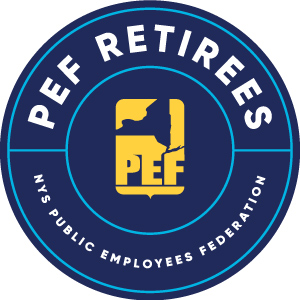 December 21, 2023 — Happy Holidays, PEF Retirees!
December 21, 2023 — Happy Holidays, PEF Retirees!
I am providing information from our Attorney General as well as AARP in this edition of Retirees in Action.
Dear New Yorkers,
It’s unfortunate, but true: Seniors are often targeted for financial exploitation and investment fraud. A recent study found that, in just a single year, older adults lost at least $2.9 billion to fraud committed both by persons they know and trust and by complete strangers. And, to make matters worse, victims who lose their money are unlikely to get it back, even if the perpetrators are apprehended.
It’s important that everyone has the right tools and information to make decisions about their finances, and to know the best ways to protect themselves and their hard earned money. This guidance provides some of those tools: how to recognize a scam; who is at risk, and — most important — how to protect yourself.
One of our office’s primary functions is protecting New Yorkers from investment and financial fraud. If you believe that you or someone you know has been victimized, call us. We have investigators and prosecutors who specialize in fighting elder financial exploitation. We will do our best to answer your questions and provide the help you need.
Sincerely,
Leticia James
New York Attorney General
Have you or a loved one been targeted by a scam?
AARP’s website has an excellent fraud support section and the NYS Attorney General also has a program called Smart Seniors. These are excellent resources for seniors or anyone who has been targeted. I have a relative who was a victim of a scam and have talked with other seniors who have been victimized. The following information is from the AARP Website and is just a sample of what’s available. During this holiday season we all need to be extra vigilant because scams are most prevalent during the holidays.
If you or a loved one has been targeted by a scam or fraud, you are not alone.
Our AARP fraud specialists provide free support and guidance on what to do next.
Common signs of a scam include:
- A phone call asking for money or personal information, such as your Social Security number.
- A request to buy gift cards to pay a purported debt or to send money to someone whom you’ve only met online.
- An unauthorized charge on your credit card.
- An email or call saying you’ve won a sweepstakes or lottery, though you don’t recall entering one.
Report a scam or fraud if:
- You get a suspicious call, text or email requesting your bank account number; instructing you to buy a gift card; or promising a prize or gift.
- You gave money or financial or medical information to someone whom you now suspect was a scammer.
- A relative or friend gave money or something of value to a suspected scammer.
Our volunteers can offer:
- Tips on how to spot a scam.
- Concrete steps to avoid fraud.
- Actions to take if you have experienced fraud.
- Emotional support from peers who have experienced fraud.
- Guidance for families concerned that a loved one is being targeted by a scammer.
- Referrals to law enforcement and other agencies that investigate fraud.
- The helpline also offers translation services.
The AARP Fraud Watch Network Helpline can be reached at 877-908-3360. Your call helps AARP and our federal, state and community partners to spot trends and respond to emerging threats.
“People who call us, they’re our boots on the ground. They’re our eyes and ears to what’s happening out in the scam world,” says Amy Nofziger, director of the Fraud Watch Network Helpline.

